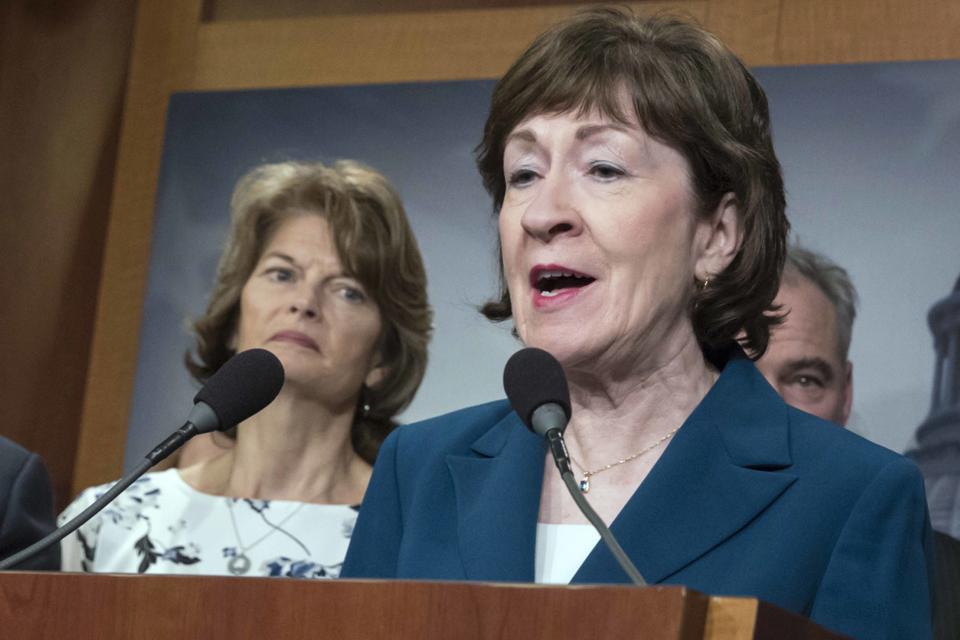Why 4 key Republicans split — and the witness vote tanked
When Lamar Alexander and Lisa Murkowski met privately in his third-floor Capitol hideaway on Thursday night, Alexander broke the news: He was going to vote against bringing in new witnesses in President Donald Trump’s impeachment trial.
The Tennessee Republican explained the rationale to his Alaska colleague: That the House managers had proven their case against the president but that it still wasn’t impeachable conduct and therefore more information was unnecessary, according to a person familiar with the exchange. But Alexander did not lobby Murkowski to join him.
Alexander also forwarded his statement announcing his decision to Sen. Susan Collins (R-Maine), who would soon send her own press release in favor of hearing from witnesses, a position shared by Sen. Mitt Romney (R-Utah).
The four Republican senators have been the crucial swing votes to help shape Trump’s trial, and they’ve been in constant communication for weeks. They banded together to devise holding the vote on witnesses in the first place, a deal that helped seal unanimous GOP support for the rules of the impeachment trial. And they were texting and calling each other with increasing regularity as Trump’s trial began in earnest.
But on the biggest question of the impeachment trial, the group was going their separate ways. And their split decision will ensure Trump gets his speedy acquittal without the threat of new testimony that could upend GOP plans.
Still, in her meeting with Alexander, Murkowski kept her decision a secret.

“No,” Alexander said when asked if Murkowski tipped her hand. “She didn’t.”
The fast-moving events isolated Murkowski. Democrats’ hope of securing witnesses appeared doomed, but the optics of what was to follow still mattered. Now she was either going to give the Republicans a clear majority against witnesses or a tied vote that would fail unless Chief Justice John Roberts took the unlikely step of breaking the tie. She told reporters she would go home, put some eyedrops in and continue to pore over documents.
Murkowski had met with McConnell privately earlier in the week, in part to gather herself for the Senate’s question-and-answer period. During those marathon sessions, she aligned herself with different factions of the party, leaving Republicans and Democrats alike guessing as to her stance.
On Friday morning the interest in Murkowski was overwhelming. CNN fixed a camera on the hallways outside her office in case she would emerge and break the news. When Murkowski left her office, she dipped out the back, bumped into E&E reporter Geof Koss and gave him the news: She was a ‘no’ and Roberts would not have to break the tie.
The moment confirmed what GOP leaders had been projecting all week: The witness vote would fail, and Trump would be acquitted by a Senate that never heard from former national security adviser John Bolton, even as new revelations in a forthcoming book rattled Washington.
“I’ve always believed there would not be votes for witness,” said Sen. Rick Scott (R-Fla.) on Friday afternoon. “It never made sense to me. Why would we go do the House’s job? It’s their job, not our job.”
Collins and Murkowski continued to take notes during Rep. Adam Schiff’s closing remarks, despite having already decided where they’d be on the witness question. As Schiff finished up, Murkowski watched intently, gently rocking back and forth in her chair. When it came time for the vote, the Alaska Republican stood up and voted no, with little fanfare.
After the vote to bring in more witnesses fell short on a 49-51 vote, she spoke with Majority Whip John Thune one-on-one before exiting the Senate chamber.
The instant relief of Republicans could play far differently over the long arc of history — and perhaps even sooner.
The GOP’s move to dismiss relevant witness testimony will be cited for years to come and be wielded by Democrats in upcoming Senate races, warned Sen. Chris Murphy (D-Conn.), who called the decision a “giant political nightmare for Republicans.”
“This is the most high-profile event of the presidency over the final two years. And I think it will have legs. I think it will have impact,” Murphy said on Friday. “We now have legitimate reason to contest the fairness of the trial and the acquittal of the president.”
But Murphy did not directly fault Alexander, even though he is widely regarded among both parties as the vote that got away from Democrats. That’s because in opposing witnesses, Alexander took great pains to fault Trump’s conduct.
“He at least was clear and forceful about how inappropriate, how wrong the president’s conduct was,” said Sen. Chris Coons (D-Del.). “But I have a hard time with him going with the step from that conclusion to saying we shouldn't remove him.”
Alexander reiterated in his Thursday night statement that it was wrong of Trump to solicit investigations into former Vice President Joe Biden. Alexander did not contest the facts presented by the House managers, and therefore, he said, he didn’t need to hear any more evidence that Trump held up aide and sought to sully a potential 2020 rival.
“It was inappropriate and wrong for the president to do what he did. I think it was proved. The question is whether you apply capital punishment to every offense,” Alexander said. “And in this case I think the answer is no.”
In making his argument against witnesses, Alexander had actually gone much farther in condemning Trump’s behavior than many of his GOP colleagues.
The reaction in his party was mixed. Sen. Rob Portman (R-Ohio) agreed Trump’s actions were “wrong and inappropriate” and Sen. Ben Sasse (R-Neb.) put it this way: “Lamar speaks for lots and lots of us.”
Others were more restrained. “We all know that he is one of the most thoughtful, well respected” senators, said Sen. Shelley Moore Capito (R-W.Va.). “I don't agree with every detail of what he said.”
Yet even though some of his colleagues were worried until late Thursday evening about Alexander's vote, it was clear from his statement that it would have taken an earth-shattering moment to back Democrats’ call for witnesses.
McConnell has maintained tight control of the trial over the last two weeks, but he mostly let Alexander do his thing, trusting in where his longtime friend would come down.
“He doesn’t ever say very much. I just told him what I was going to do,” Alexander said. “Senator McConnell and I have known each other for 50 years and he knows better than to tell me how to vote.”

The break with Alexander came as Collins runs for reeelection under sustained attack from Democrats for not, in their view, pushing hard enough on witnesses. But the other Republicans up for reelection argued strongly against witnesses, as did McConnell.
Collins had only warm feelings for Alexander, a three-term senator and chairman of the Health, Education, Labor and Pensions Committee that Collins serves on.
“He was kind enough to send me his statement before he released it. So I knew a little bit in advance,” Collins said on Friday. “But I have a lot of respect for him.”
Romney argued internally that it made sense to hear more evidence given that Bolton had been in the room with the president, but the 2012 presidential nominee’s push did not move any of his colleagues.
Murkowski’s calculation became more difficult after Alexander told McConnell and colleagues how he would vote on Thursday evening. She has previously bucked her party in high-profile moments, acting as the lone Republican to vote against Supreme Court Justice Brett Kavanaugh’s confirmation and voting with Collins and the late Sen. John McCain (R-Ariz.) to tank Republicans’ effort to repeal the Affordable Care Act.
Now in the trial of whether to remove the president from office, she would be either the deciding vote against witnesses or throw responsibility to Roberts and put an asterisk over a historic Senate moment.
During Thursday’s question-and-answer session, Sen. Elizabeth Warren (D-Mass.) had effectively called out Roberts for overseeing a trial without new evidence by asking whether it might “contribute to the loss of legitimacy of the Chief Justice, the Supreme Court, and the Constitution.”
A few hours later, the moderate Alaska Republican made clear Warren’s suggestion was still weighing on her.
“Some of my colleagues intend to further politicize this process, and drag the Supreme Court into the fray, while attacking the chief justice. I will not stand for nor support that effort,” Murkowski said.
Meanwhile, soon after dividing on the question of witnesses, the new moderate power center in the 53-member GOP caucus was back at it.
As Senate Republicans tried to figure out how to wind down Trump's trial Friday afternoon, McConnell privately met with a familiar foursome: Murkowski, Collins, Romney and Alexander.
Melanie Zanona contributed to this report.

